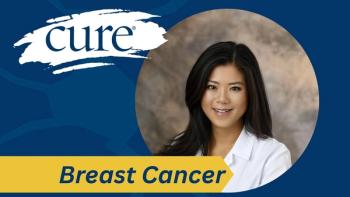
|Videos|December 4, 2018
Learning the Lingo of Cancer
Author(s)Shannon Pulaski
A cancer diagnosis can lead to discussions about family health history, as well as a whole new world to learn about.
Advertisement
Author and patient advocate Shannon Pulaski discusses the importance of learning her family’s health history — something that hardly ever crossed her mind until her mother received an ovarian cancer diagnosis.
Pulaski, who is the author of the book “Mom’s Genes,” tested positive for the BRCA mutation, and now advocates for other people to learn their family health history and start that conversation.
Advertisement
Advertisement
Advertisement
Trending on CURE
1
New Combination Treatment Approach Studied in Pancreatic Cancer
2
Radiation Oncologist and Breast Cancer Survivor Shares Her Story
3
Expert Explains Adjuvant Temozolomide Boosts Astrocytoma Survival
4
FDA Removes Use Limitation for Yescarta in Primary CNS Lymphoma
5




